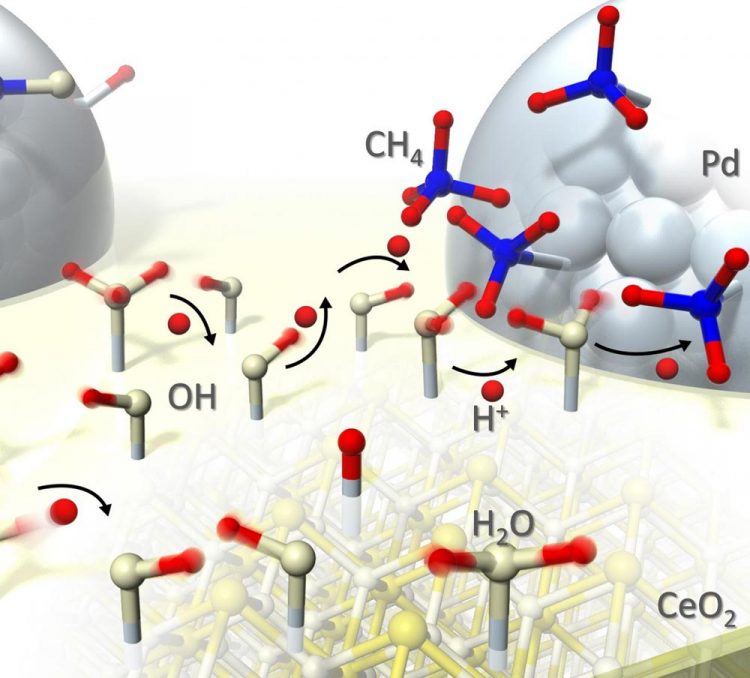New process produces hydrogen at much lower temperature

This is an illustration of proton hopping during catalytic reaction. Credit: Waseda University
Waseda University researchers have developed a new method for producing hydrogen, which is fast, irreversible, and takes place at much lower temperature using less energy. This innovation is expected to contribute to the spread of fuel cell systems for automobiles and homes.
Hydrogen has normally been extracted from methane and steam using a nickel catalyst at temperatures of over 700°C. However, the high temperature creates major challenges for widespread use.
The group led by Professor Yasushi Sekine, Waseda University Faculty of Science and Engineering, developed a method which allows hydrogen extraction at temperatures as low as 150~200°C.
This shift greatly reduces energy input needed to produce hydrogen fuel, extends catalyst life, reduces the cost of construction materials, and reduces complexity of heat-management (cooling) systems.
Although the research group had already seen that a fast reaction would be possible even in the range of 150~200°C by applying a weak electric field (surface protonics), the mechanism had not been fully understood.
In this research, the group is the first to explain the mechanism by observing the catalyst during reaction. Protons move quickly through water adsorbed on the catalyst's surface, and protons' surface “hopping” allows reaction to proceed at low temperatures. Furthermore, the collision of the protons and the adsorbates prevents reversal of the reaction.
As momentum grows for the commercialization of hydrogen, this research is not only applicable to hydrogen production, but also to many consumer products since the same mechanism makes it possible to lower the temperature for various reactions involving hydrogen or water. The process is already being applied to research for improving energy efficiency in automobiles by creating reactions between exhaust gases and fuel at low temperature.
###
This research will be published in Scientific Reports, by Nature Publishing Group, on December 1 (5:00am EST) under the title “Surface Protonics Promotes Catalysis.”
Media Contact
All latest news from the category: Materials Sciences
Materials management deals with the research, development, manufacturing and processing of raw and industrial materials. Key aspects here are biological and medical issues, which play an increasingly important role in this field.
innovations-report offers in-depth articles related to the development and application of materials and the structure and properties of new materials.
Newest articles

A universal framework for spatial biology
SpatialData is a freely accessible tool to unify and integrate data from different omics technologies accounting for spatial information, which can provide holistic insights into health and disease. Biological processes…

How complex biological processes arise
A $20 million grant from the U.S. National Science Foundation (NSF) will support the establishment and operation of the National Synthesis Center for Emergence in the Molecular and Cellular Sciences (NCEMS) at…

Airborne single-photon lidar system achieves high-resolution 3D imaging
Compact, low-power system opens doors for photon-efficient drone and satellite-based environmental monitoring and mapping. Researchers have developed a compact and lightweight single-photon airborne lidar system that can acquire high-resolution 3D…





















